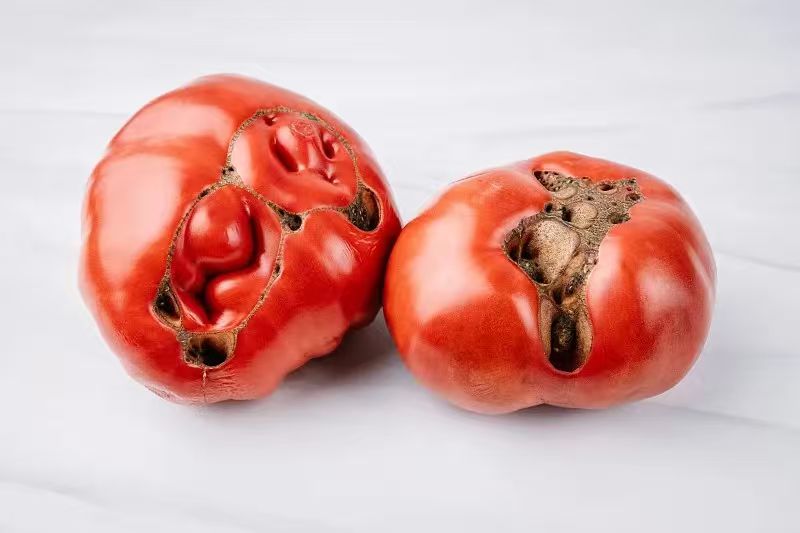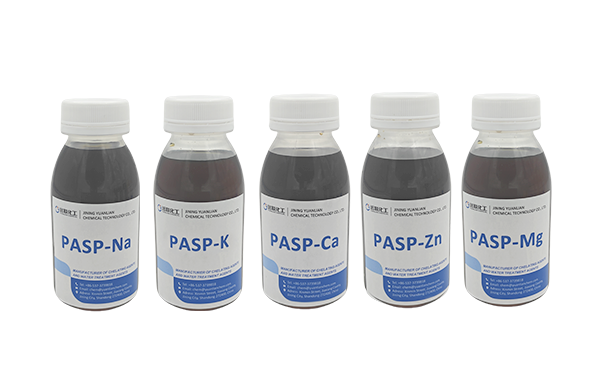
Solving Crop Fruit Cracking: From Micronutrient Deficiency to Effective Solutions (Tailored for European Growing Scenarios)
Across Europe, fruit cracking is a common challenge for growers, affecting a range of high-value crops such as tomatoes, apples, citrus fruits, grapes, and melons. Beyond reducing the marketability of produce—retailers often reject cracked fruits—it also increases the risk of crop infestation by pests and diseases, ultimately leading to significant yield losses. Many growers attribute fruit cracking to poor irrigation management, but in reality, the hidden cause is often micronutrient deficiency. This article explores the link between fruit cracking and key micronutrients, and presents a science-based solution, with a focus on Yuanlian Chemical’s Polyaspartic Acid (PASP), a product that delivers breakthrough results in preventing fruit cracking.
1. The "Invisible Killers" Behind Fruit Cracking: Gaps in Key Micronutrients
Fruit cracking rarely stems from a single factor; it is usually the result of fluctuating moisture levels combined with nutritional imbalance. When soil moisture surges suddenly—due to heavy rainfall or over-irrigation—fruits absorb water rapidly and expand. If the fruit peel lacks toughness and structural stability, cracking becomes inevitable. Micronutrient deficiency directly weakens the peel’s stress resistance and the crop’s ability to cope with environmental changes, with three elements playing a crucial role:

1.1 Calcium: The "Guardian" of Peel Toughness
Calcium is a fundamental component of cell walls, promoting the formation of tough, elastic peel tissue. It strengthens cell structures, enabling the peel to withstand the internal pressure generated as the fruit expands. Calcium deficiency often leads to loose cell arrangement and thin cell walls. For example, blossom-end rot (accompanied by cracking) in tomatoes and cracking associated with bitter pit in apples are mostly linked to insufficient calcium uptake during the flowering and fruit enlargement stages.
1.2 Boron: The "Bridge" for Nutrient Transport
Although crops require boron in small quantities, it is essential for transporting carbohydrates to developing fruits and plays a key role in synthesizing pectin—a "binding agent" that holds cells together. Pectin ensures tight cell cohesion, reducing the risk of cracking. Boron deficiency creates a "nutrient supply gap," causing the peel to grow more slowly than the fruit flesh. This imbalance eventually leads to longitudinal cracking, a problem particularly common in citrus fruits and grapes.
1.3 Zinc: The "Strengthener" of Stress Resistance
Zinc enhances crop photosynthesis and enzyme activity, improving the fruit’s ability to adapt to environmental stress (such as sudden rainfall after drought). Zinc deficiency results in underdeveloped epidermal cells with reduced tensile strength. When exposed to rapid changes in moisture, irregular cracking occurs, which is particularly noticeable in melons and watermelons.
2. Scientifically Solving Fruit Cracking: Micronutrient Supplementation + Choosing the Right Enhancer
Addressing fruit cracking requires focusing on two core priorities: targeted supplementation of key micronutrients + improving nutrient absorption efficiency. Traditional methods (such as foliar spraying of single-element fertilizers) suffer from low absorption rates and short effectiveness, failing to meet the crop’s nutritional needs throughout the entire fruit development cycle. However,Polyaspartic Acid (PASP) developed by Yuanlian Chemical—an efficient biostimulant and nutrient enhancer—solves the problem of micronutrient absorption at its root, providing a "one-stop solution" for preventing fruit cracking.

2.1 PASP: The "Transport Manager" for Micronutrients, Boosting Absorption by 300%
The molecular structure of PASP contains a large number of carboxyl groups, which form stable "chelate complexes" with micronutrients such as calcium, boron, and zinc. These chelated micronutrients are not easily fixed in the soil (for example, calcium often binds with phosphorus in the soil to form insoluble calcium phosphate) and can be quickly absorbed by crop roots and leaves. Experimental data shows that with the addition of PASP, the absorption efficiency of calcium by crops increases by 3-5 times, and the absorption efficiency of boron and zinc increases by 2-3 times. This ensures that micronutrients are promptly delivered to the fruit’s epidermal cells, promoting cell wall development and pectin synthesis, and enhancing peel toughness from the source.
For instance, mixing PASP with calcium fertilizers (such as calcium nitrate) for foliar spraying during the tomato enlargement stage can increase calcium content in the peel by over 40%, reducing cracking by 60%-70%. After citrus flowering, irrigating with PASP-chelated boron-zinc fertilizer not only prevents "split fruit disease" but also improves fruit sweetness and peel luster.
2.2 PASP: The "Protective Shield" for Fruit Stress Resistance
In addition to improving nutrient absorption, PASP regulates crop physiological metabolism and enhances stress resistance. It promotes the synthesis of osmoregulatory substances such as proline and soluble sugars, buffering the impact of rapid moisture changes on fruit cells. When heavy rainfall follows drought, the internal pressure of the fruit rises gradually, allowing epidermal cells to adapt incrementally and avoiding cracking caused by "sudden expansion."
In watermelon cultivation, applying water-soluble fertilizer containing PASP 2-3 times consecutively from transplanting to the enlargement stage not only supplements calcium and zinc but also ensures uniform peel thickness and enhanced toughness. Even in the event of heavy rainfall, the cracking rate can be controlled below 5%, far lower than the 20%+ cracking rate seen with traditional fertilization methods.
2.3 PASP: Eco-Friendly and Residue-Free, Meeting EU Standards
Yuanlian Chemical’s PASP is produced using a bio-fermentation process, making it fully biodegradable. It decomposes into amino acids and carbon dioxide in the soil within 1-2 months, leaving no environmental residues and no accumulation in fruits—fully complying with the strict requirements of EU green agriculture and organic agriculture. Unlike traditional chemical chelating agents such as EDTA, PASP does not inhibit the activity of soil microorganisms; it also improves soil aggregate structure and promotes root growth, forming a sustainable "soil-crop-nutrient" cycle.
2.4 Customized Application Plans for European Crops
Yuanlian Chemical has developed customized PASP application plans based on the characteristics of major European crops to maximize effectiveness:
-
Melons & Watermelons: Soak seeds in a 0.2% PASP solution before sowing to promote root development. During the enlargement stage, apply 500g of PASP-chelated calcium-zinc fertilizer per acre via drip irrigation, repeating every 10-15 days for 2 consecutive applications. This can reduce the cracking rate by over 70%.
-
Apples & Citrus Fruits: Mix 1kg of PASP with organic fertilizer per acre and apply before bud break. From post-flowering to the enlargement stage, spray a 0.3% PASP-chelated calcium-boron fertilizer on the leaves every 15 days. This not only prevents cracking but also reduces fruit deformity.
-
Tomatoes & Peppers: Add 0.1% PASP to irrigation water during the seedling and fruiting stages, combined with foliar spraying of calcium fertilizer. This completely resolves issues such as blossom-end rot cracking and longitudinal cracking, while also improving fruit firmness and shelf life.
3. Conclusion: Choose the Right Product to Eliminate Fruit Cracking Woes
Fruit cracking may seem like a "moisture problem," but in essence, it is a "nutritional problem." Solving fruit cracking requires not only supplementing elements such as calcium, boron, and zinc but also using an enhancer that maximizes nutrient absorption efficiency. Yuanlian Chemical’s PASP stands out as a reliable choice for European growers, thanks to its three core advantages: high-efficiency chelation, stress resistance and fruit protection, and eco-friendliness.
To date, PASP has been promoted and applied in vegetable and fruit planting bases across more than 20 provinces in China, helping growers reduce fruit cracking-related losses by over 1 billion RMB. Whether for large-scale commercial farms or smallholdings, the scientific use of PASP enables the cultivation of high-quality, crack-free agricultural products, significantly increasing market value and growing profits.
If European growers are struggling with fruit cracking, Yuanlian Chemical’s PASP is undoubtedly a compliant, efficient, and sustainable solution. Please feel free to contact us at any time to obtain a customized plan for your crops!
Yuanlian Chemical specializes in the production of polyaspartic acid (PASP),tetrasodium iminodisuccinate(IDS), GLDA, MGDA etc. with stable quality and excellent quantity!





Contact us